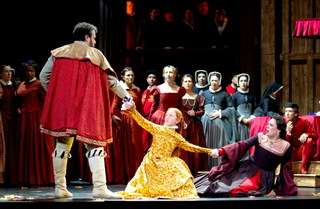|
Back
A Regal Radvanovsky Sings Bolena in the US Capital Washington
Washington National Opera
09/15/2012 - & September 18, 21, 24, 27, 30, October 3, 6, 2012
Gaetano Donizetti: Anna Bolena
Sonia Ganassi (Giovanna Seymour), Sondra Radvanovsky Anna Bolena), Claudia Huckle (Smeton), Oren Gradus (Enrico VIII), Kenneth Kellogg (Lord Rochefort), Shalva Mukeria (Riccardo/Percy), Aaron Blake (Sir Hervey)
Washington National Opera Orchestra and Chorus, Antonello Allemandi (Conductor)
Stephen Lawless (Director), Benoit Dugardyn (Set Design), Ingeborg Bernerth (Costume), Mark McCullough (Lighting)

(© Scott Suchman)
The Washington National Opera opens its season with Donizetti’s Anna Bolena. The production, created by the Dallas Opera, is a fanciful conceit. Designer Dugardyn sets the opera in the Globe Theater, the principal actors all on stage level, supporting characters and chorus often gathered on the balconies, both a part of the action and observers, often the court’s relation to royals.
The horseshoe shape of the Globe is echoed by the 2300 seat, warmly welcoming opera house, and completes an oval, which intimately includes the audience in the royal proceedings. The proscenium wall has effectively been breached.
In preparation for the hunting scene, a shield drops from the ceiling. It is covered with deer figures and looks like a reredos, echoing the big church story, which drives the personal drama. The shield is a harbinger of death. Visual touches throughout keep your eyes as well as your ears at full attention.
The action is not big royal politics, but rather the intimate life of royals, an elegant soap opera, charged with emotions of Shakespearean dimension. Vocal challenges are Herculean and give great pleasure throughout the evening. Yet the big scale singing is tailored to intimate conflicts.
The walls of the stage at stage floor level constantly move to suggest the court and also private rooms and a jail. Director Stephen Lawless uses these walls “as though they had ears,” whispering walls.
Front and foremost is Sondra Radvanovsky singing Anna. Her voice, among the most beautiful in the world, displays the pleasures of bel canto vocalization. Bending, shaping, shading, she weaves a tortured interior world as she sings. Dynamics are in control, cavatinas garlanded in sorrow as phrases often end beautifully in a whisper. With subtle coloring, Radvanovsky carefully crafts her character. Every step of the way, we see the shifts and changes of her difficult position. This rich take on the role swings toward Anna’s recognition: the punishment fits her earlier crime, taking Henry away from his first wife, Catherine. The opera is Anna’s story and a dark one. In its infinite variety, Radvanovsky makes the role hers.
Stephen Lawless directs for surprising humor as the opportunity arises. In the hunting scene, two characters don deer heads and prominent antlers. Periodic hand-slapping at first amuses and then sounds like the clap of the guillotine, to which the drama is proceeding. Lawless has created ensemble performances throughout, singers interacting with each other in intimate scenes, and revealing distinct characters in a sestet near the end of Act I and the trio in Act II.
Scenes for Seymour and Anna, are subtly and yet dramatically rendered by the great Sonia Ganassi in dialogue with Radvanovsky. Ganassi molds her lines with a lovely legato and is passionate in her conflict. The face off between guilty Giovanna and Anna now imprisoned is wrenching. Huckle in the trouser role Smeton sings lovely melodies in contrast to Anna’s anguish.
Shalva Mukeria singing Percy is a revelation. His tenor has an edge, which contrasts with the other singers. It suggests his role in the drama, an edgy outsider who is the spoiler here. He and Anna share a particularly touching, but melancholy moment, wishing they were somewhere else.
The cast is marvelous throughout, displaying the bel canto directive: voices should display intelligent imagination. Character development is not buried in melodrama. Antonello Allemandi in his WNO debut conducted to reveal the singers’ voices. Dramatic emphasis was enhanced by romantic pathos.
Later 19th century composers would complain that bel canto was only about extraordinary vocal display, its stories fluffy. Radvanovsky surely displayed her big, blooming voice in all its richness, but she is always deep in character. Embellishments add to her defiant farewell. In the familiar “Home, Sweet Home”, as she makes her final peace, she has moved from majestic to accusatory, profound to consoling to ecstatic. Her Anna is wonderfully complex, and yet accessible.
In Anna Bolena, the substance provided by Felice Romani in the libretto and the music Donizetti composed to drive the story arc and display character together realize a very special opera, a triumph in Washington.
Susan Hall
|